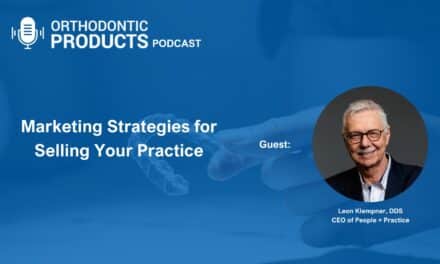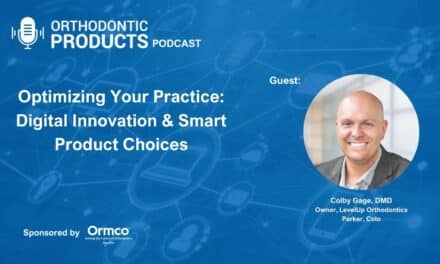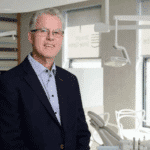Summary: In this episode of the Orthodontic Products Podcast, Roger Levin, DDS, of Levin Group, discusses the “Seven Reasons Your Staff Meetings Will Fail and What You Can Do About It.” Levin provides valuable insights into why staff meetings often underperform and offers strategies to improve their effectiveness, especially in orthodontic practices.
Key Takeaways:
- Create a prioritized agenda to improve meeting structure and productivity.
- Leaders should bring energy and positivity to inspire engagement.
- Make decisions in meetings and continuously seek feedback for improvement.
In this Orthodontic Products Podcast episode, practice consultant Roger P. Levin, DDS, of Levin Group spoke with OP chief editor Alison Werner about the seven reasons staff meetings fail and what can be done to fix them. One key issue he highlighted is the absence of a well-structured agenda. Many practices hold disorganized meetings, leading to unproductive discussions.
Levin recommended creating an agenda with prioritized items, ensuring that the most critical topics are covered early. This helps avoid the common mistake of rushing through important issues at the end, a problem that negatively affects meeting efficiency.
Importance of a Positive Tone
Levin also emphasized the importance of maintaining a positive tone during meetings. Leaders have the opportunity to set the mood for the entire team. According to Levin, the team often mirrors the leader’s behavior, making it crucial to eliminate negativity during staff meetings.
Complaints and corrective feedback should be addressed in separate sessions. Staff meetings should focus on constructive, positive discussions that inspire growth and foster engagement among team members.
Bring Energy and Fun
Energy and engagement are critical components of successful staff meetings. Levin stressed that low-energy meetings, regardless of content quality, fail to capture the team’s attention. Leaders should bring enthusiasm to the table to energize the team, using tools such as rewards, games, or trivia questions.
Adding an element of fun can significantly improve engagement. Levin suggested incorporating surprises or rewards like gift certificates, or starting meetings with light-hearted activities. This helps break the monotony and fosters a more enjoyable and engaging atmosphere.
Make Decisions and Continuously Improve
Levin also pointed out that meetings without decision-making leave team members feeling their time was wasted. It’s important to make decisions during the meeting, rather than deferring everything for future discussion.
Lastly, Levin advised continuously improving the meeting format. Repetition can bore participants, so leaders should seek input from their teams on how to make the meetings more dynamic and productive. Introducing industry trends or discussing new technologies can also keep staff engaged and informed.
Recommended Meeting Frequency
Levin recommended orthodontic practices hold two-hour monthly meetings to foster productivity and collaboration. These meetings should include lunch and cover all critical issues without dragging on for too long. He also suggested delegating sections of the meeting to different team members to encourage participation and ownership.
Podcast Transcript
Alison Werner
Hello and welcome to the Orthodontic Products Podcast. I’m your host, Alison Werner. Today we’re going to talk about the seven reasons your staff meetings will fail and what you can do about it. And hear to break it down is Dr. Roger Levin at the practice management consulting firm Levin Group. Dr. Levin, great to see you again.
Roger Levin
Great to be with you, Alison I love these interviews and podcasts and I hope we’re helping a lot of people.
Alison Werner
Yeah. And so this one’s going to be kind of tight because we’re going to really directly get into those seven reasons your staff meetings are failing. So you and I have talked about this before. We’ve talked about how staff meetings are not at their optimal level. So can you explain why you think that?
Roger Levin
I can, you know, as, as dentists, learn basic business principles somewhere, somehow. And one is you should have staff meetings. And another, not our topic today is you should have performance reviews. And I have a section in one of my orthodontic management webinars called why your staff hates staff meetings and performance reviews. but we think that just because we call a meeting, everybody is engaged and interested in wants to be
But the real definition of most staff meetings is to show up late, do a lot of complaining, eat the pizza and leave early. So we want to now turn these staff meetings into powerhouses because meetings are critically important for every business, including the orthodontic practice. And when I see the best practices in the country and we get a bird’s eye view to some of them in consulting, we find that they do have excellent meetings that are highly focused and very productive.
So I have seven reasons why your staff meetings will fail. Now I’m never negative, so part two is, and what to do about it. And I’m gonna walk everybody through that. If you do these seven things, the meetings you have now will be better and will become great. So here we go. as Alison, as you said, I’ll run through all seven and then you can ask me questions. Number one, your meetings are not well thought out. Take the time to create an agenda.
Alison Werner
Yeah.
Roger Levin
Put your agenda in priority order. What is the most important thing we have to talk about? Make that number one, because if that’s the last agenda item, you might run out of time or have limited time at the end and you rush through it. So set an agenda and be relevant. Make sure the topics covered are relevant. We’re not talking about people’s vacations. We’re not talking about what we saw in the news last night. We’re following an agenda. We’re staying focused.
and we’re getting people involved. Number two, your staff meetings aren’t positive. This is your chance as a leader to bring a positive orientation to the entire team. This is your one time a month that you get together with everyone on the team and they get to see how positive you are as a leader. Now I believe positive is contagious. I believe the team gradually begins to look like the orthodontist. I joke about that in seminars.
And all the team members say, I don’t want to look like my orthodontist. and maybe with good reason because they look better. But the point is they’re going to emulate the characteristics and traits that they see. So as a leader, you want to kill negative. If people go off on negative, turn every negative positive. One of my statements in a communication seminar is anything negative can be said positive. Don’t talk about what was wrong. Talk about how it can be right.
Don’t talk about the bad patient experience. Talk about improving customer service. Our webinar, our podcast that we did recently. So if it’s not positive, you’re just going to bring people down. Staff meetings are not complaint, angry, corrective sessions. There’s another time to do that. Number three, that staff meeting is not taken seriously. If the orthodontist shows up late, that’s your first indication
you’re not serious about this meeting. And doctors think that because we’re doctors and I am one of them, that well, if we’ve got a patient, that’s an excuse to show up late. Your staff meeting is just as important as a new patient consult, as meeting a referring doctor for lunch or a drink, as showing up in the office in the morning. Being late is bad leadership. And it also, and if the meeting is scattered, you show up late. You’re looking for your agenda.
You’re not sure what you’re talking about. You look disorganized. Those are not the cues you want to give your team. They just tune out at that point. Remember, these are the reasons you will fail in staff meetings and how can we optimize them? Number four, no energy. Your team needs energy. I believe that people need air, water, food, and energy. And without it, they suffer.
Bring them the energy. Take a minute before the meeting, get yourself energized and excited. Thank everybody for their work, for being great, for their attitudes, for following the protocols and principles of the practice. But when there’s no energy, it doesn’t matter how good the topic is, it’s boring. nobody, we live in a world today where it’s pretty hard not to be boring. People live by social media and cell phone. And you know the social media joke.
When you’re reading Facebook or Instagram, you’re the only one not having a good life. Everybody else is having a perfect life. You’re having a terrible, you know, your life is just normal. People, if there’s no energy, they’re bored, they tune out and they’re not engaged. Big word for meetings, engagement. Is your team engaged in the meeting? Number five, they’re not fun. Why not have fun? Fun is great. How do you have fun? You create surprises.
Alison Werner
Right.
Roger Levin
One person has a Post -it Note under their chair and they win $100 at the meeting. You bring in surprise lunches for them. You give out gift certificates. You tell them about a day you’re gonna shut down and give everybody off or leave early. Have fun in the meeting. Start the meeting with a joke or a trivia question. I know it sounds silly, but it changes the entire dynamic of that meeting. At Levin Group
We have an executive call every morning from 10 to 11 o ‘clock. We start it with everybody first going around, taking one minute and telling something good that’s happened in their life recently. It can be big or small, doesn’t matter. And then we have a trivia question and people love it. And if you forget the trivia question, people say, well, what’s the trivia question? Now these, are executives that love this stuff. Your team will love this stuff. Number six, you don’t make decisions.
The purpose of a meeting is to make decisions. If every agenda item ends with, I’ll look into that, I’ll think about that, I’ll get back to you, nobody cares about your meeting anymore, it’s a waste of time. You don’t have to make every decision, but most of the time, you should be making a decision in that meeting about what you’re recommending, what you’re gonna do, what the training will be, how we improve customer service, what a goal would be. Make decisions in the meeting. And finally, number seven,
you never improve your meetings. You do the same thing over and over and over. I don’t care how good your meeting is, repetition gets boring. It’s irrelevant. People just show up and here we go again, pull the string and out comes the words. So ask your team, how do we make these meetings better? What do you wanna do in these meetings? Do you want training? Do you wanna talk about what’s going on in the dental industry? We recommend to our clients in addition to
focusing on your practice, come in with two or three things that’s happening in the orthodontic industry. What’s changing? What’s the new technology? Not that you have to buy it. For example, you and I did a podcast on remote monitoring. Well, even if you don’t have it, it’s a good thing to educate the staff about. It’s kind of fun. Make your meetings broader, help people grow and develop, and then leave time at the end for questions and answers. Teach your
bring your questions to the meeting, because this is where we should talk about it, and everybody should hear your question, and everybody should hear your answers. So, those are seven reasons your staff meetings will fail and what to do about it
Alison Werner
All right, so my first question is, what’s your advice on frequency of meetings and maybe length of meetings, if you have any guidelines?
Roger Levin
You know, you can go in a lot of directions, but as usual, I do have a recommendation, which would be two hours once a month. And one hour might be your lunchtime and one hour might be production time. If you take the last hour of the morning in orthodontics, that’s often a slower period of time for many practices. Now, is it worth taking an hour a month or 12 hours a year out of, you know, patient time, production
And my answer is absolutely, because these meetings should make you so much more efficient that the time you lose to meet is minimal compared to the efficiency gains that you achieve to make the practice more efficient and effective. As you know, Alison, we have both referral marketing and management consulting, and management consulting is all about systems. And it’s in these meetings where you talk about
a step in a system that needs to be changed or eliminated or improved. So if you only have an hour and you’re eating lunch, it’s really not always enough time to cover all the topics you want to cover. So out of respect to your team, out of respect to improving the practice, to optimize the meeting, I like two hours with lunch, middle of the day, once a month, start on time.
And don’t go two hours actually, end at least 10 minutes early so the team can be ready for their afternoon patients.
Alison Werner
Okay. And then do you have any tips on how to delegate sections for other team members to speak on or should the doctor really be taking the lead
Roger Levin
No, that’s a great question. I should have covered that and that’s really great. When you set the agenda, let’s say you have eight agenda items for that meeting. You put the name of the person who’s gonna lead that agenda item next to the item. So four of the items might be led by an orthodontist, two by the office manager, that’s six in our hypothetical eight. One might be by an assistant, one might be by the scheduling coordinator or the treatment coordinator.
or even the professional relations coordinator, the PRC, who is responsible for referral marketing. But it’s all about systems, and if you don’t take the time to work on them and improve them, you won’t realize that you’re becoming more and more inefficient and you’re falling behind. And if you’re busy, you always have a sense, I’m so busy, I must be successful, but you’re not as successful by far as you could be.
Alison Werner
Well, Dr. Levin, thank you so much for this. think this was really helpful and it’s a great, you know, quick and dirty on, you know, how you can action items you can take right now. So thank you so much for this.
Roger Levin
Yep. My pleasure. Thank you again, Alison.













